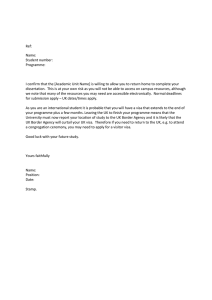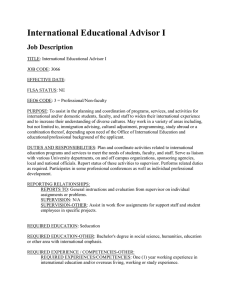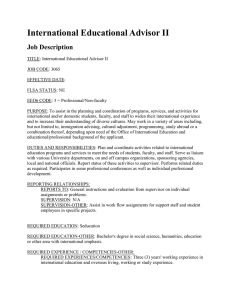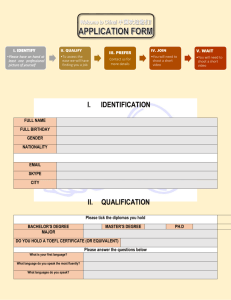1 Immigration and Right to Work Update – April 2015
advertisement
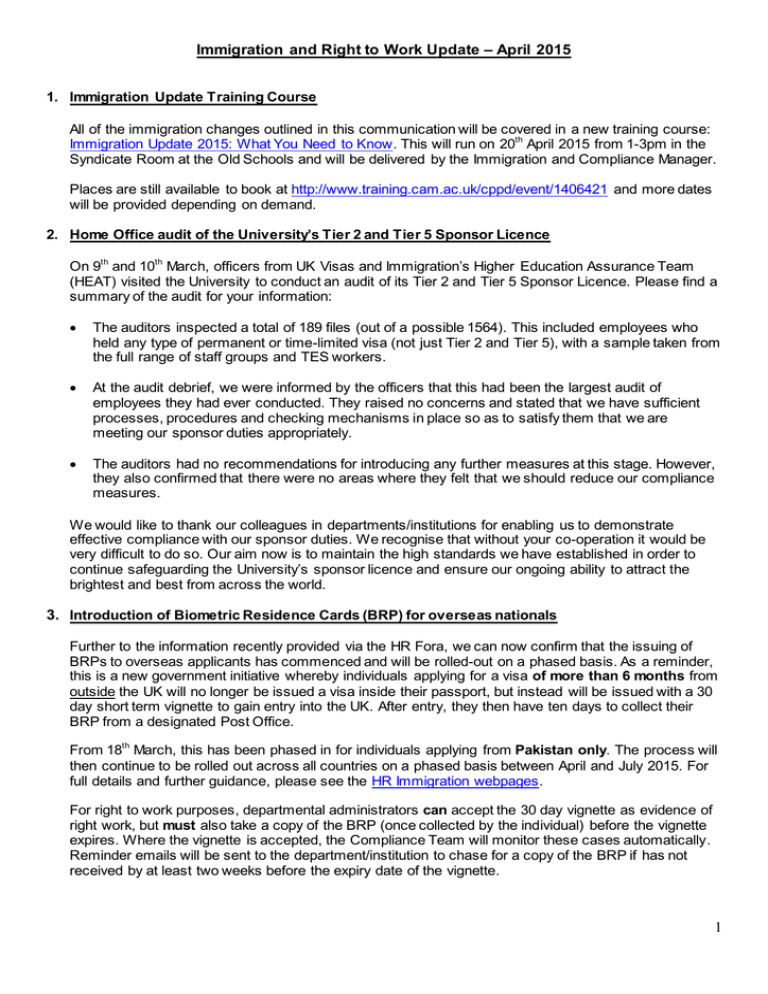
Immigration and Right to Work Update – April 2015 1. Immigration Update Training Course All of the immigration changes outlined in this communication will be covered in a new training course: Immigration Update 2015: What You Need to Know. This will run on 20th April 2015 from 1-3pm in the Syndicate Room at the Old Schools and will be delivered by the Immigration and Compliance Manager. Places are still available to book at http://www.training.cam.ac.uk/cppd/event/1406421 and more dates will be provided depending on demand. 2. Home Office audit of the University’s Tier 2 and Tier 5 Sponsor Licence On 9th and 10th March, officers from UK Visas and Immigration’s Higher Education Assurance Team (HEAT) visited the University to conduct an audit of its Tier 2 and Tier 5 Sponsor Licence. Please find a summary of the audit for your information: The auditors inspected a total of 189 files (out of a possible 1564). This included employees who held any type of permanent or time-limited visa (not just Tier 2 and Tier 5), with a sample taken from the full range of staff groups and TES workers. At the audit debrief, we were informed by the officers that this had been the largest audit of employees they had ever conducted. They raised no concerns and stated that we have sufficient processes, procedures and checking mechanisms in place so as to satisfy them that we are meeting our sponsor duties appropriately. The auditors had no recommendations for introducing any further measures at this stage. However, they also confirmed that there were no areas where they felt that we should reduce our compliance measures. We would like to thank our colleagues in departments/institutions for enabling us to demonstrate effective compliance with our sponsor duties. We recognise that without your co-operation it would be very difficult to do so. Our aim now is to maintain the high standards we have established in order to continue safeguarding the University’s sponsor licence and ensure our ongoing ability to attract the brightest and best from across the world. 3. Introduction of Biometric Residence Cards (BRP) for overseas nationals Further to the information recently provided via the HR Fora, we can now confirm that the issuing of BRPs to overseas applicants has commenced and will be rolled-out on a phased basis. As a reminder, this is a new government initiative whereby individuals applying for a visa of more than 6 months from outside the UK will no longer be issued a visa inside their passport, but instead will be issued with a 30 day short term vignette to gain entry into the UK. After entry, they then have ten days to collect their BRP from a designated Post Office. From 18th March, this has been phased in for individuals applying from Pakistan only. The process will then continue to be rolled out across all countries on a phased basis between April and July 2015. For full details and further guidance, please see the HR Immigration webpages. For right to work purposes, departmental administrators can accept the 30 day vignette as evidence of right work, but must also take a copy of the BRP (once collected by the individual) before the vignette expires. Where the vignette is accepted, the Compliance Team will monitor these cases automatically. Reminder emails will be sent to the department/institution to chase for a copy of the BRP if has not received by at least two weeks before the expiry date of the vignette. 1 4. NHS surcharges for visa applications Another topic recently raised at the HR Fora was the introduction of an NHS surcharge for individuals who require a visa for the UK. This is a new measure introduced by the Government to ensure that nonEEA nationals make an additional, up-front contribution to the NHS whilst they are living and working in the UK. The payment will go directly into the NHS and will ensure the individual is entitled to full access to the NHS on the same terms as a permanent UK resident. This will take effect from 6 April 2015 for all new visa applications. It will not be applied retrospectively. From this date, applications for a visa made by staff and their dependants will cost an additional £200 per person per year that their visa is valid, on top of the visa application fee. The full cost must be paid by the individual at the point of application. The only exceptions to paying the surcharge will be where: An individual is applying for a visa of 6 months or fewer; or The individual is a citizen of Australia or New Zealand. Departments/institutions may choose to reimburse individuals for the surcharge on a case-by-case basis as appropriate in the circumstances (as is the case with visa costs). This would be a taxable benefit and would need to be managed through the P11D process. Further guidance, including links to detailed UKVI guidance, can be found on the HR Immigration webpages. 5. Changes in the Immigration Rules from 6 April 2014 a) Minimum salary rates for Tier 2 applications The minimum salary rate we can sponsor an individual under Tier 2 will rise from £20,500 to £20,800. There is an exemption from advertising in Universal Jobmatch if the salary in the advert is over £71,600. This will rise to £72,500. There is an exemption in the Resident Labour Market Test if the individual will earn more than £153,500. This will rise to £155,300. In April of each year, the government increases the minimum salary rate for the SOC Codes. The University most commonly uses the six PhD level SOC Codes in support of Tier 2 Certificates of Sponsorship. From 6 April 2015, there will be no change to the ‘new entrant’ rate for any of the PhD level SOC Codes. For changes to the ‘experienced’ rate, please see the table below: SOC Code 2111 2112 2113 2114 2119 2311 ‘New Entrant’ rate £21,000 £21,000 £21,000 £21,000 £21,000 £25,000 ‘Experienced’ rate £27,200 £27,200 £27,200 £27,200 £27,200 £31,400 Codes 2111-2119: Research Associates – no impact. Current starting salary is £28,695 (point 39) which is well above the ‘new entrant’ and ‘experienced’ rates for the SOC Code. Codes 2111-2119: Research Assistants – no impact for ‘new starter’ rate. Current starting salary is £24,289. For the ‘experienced’ rate, departments/institutions will only be able to appoint to the top two points of the Grade 5 scale (point 38 and 39) and will be required to seek authorisation for this via the HR School’s Team using the HR4 process (unless an under-appointment for a Research Assistant/Research Associate post is being made; please see 2 http://www.hr.admin.cam.ac.uk/recruitment/stage-4a-appointment-administration/determine-startingsalary). Code 2311: Lecturers – no impact. Current starting salary is £38,511 (point 49) which is well above the ‘new entrant’ and ‘experienced’ rates for the SOC Code. b) Changes to the cooling off period for Tier 2 There is a minor change to the ‘cooling-off’ period. Previously, any individual who held a Tier 2 visa and left the UK could not apply for another Tier 2 visa for at least 12 months. This requirement will be waived where the previous Tier 2 visa, from any employer, was issued for three months or less. 6. Increase to Certificate of Sponsorship (CoS) application fees From 6 April 2015, the cost of a Tier 2 CoS will increase from £184 to £199. The cost of a Tier 5 CoS will also increase from £14 to £21. The CoS application forms will be updated shortly to reflect this increase. 7. Visitor visa simplification From 24 April 2015, the current plethora of visitor visa routes will be consolidated from fifteen to four. The four routes will comprise: 1. Visitor (standard) - this consolidates 12 existing visitor routes including tourist, business, academic visitors; 2. Visitor (to hold their marriage or civil partnership in the UK); 3. Visitor undertaking permitted paid engagements; and 4. Visitor transiting the UK. Therefore, instead of individuals being required to apply for either a business or academic visitor visa in order to visit the University, they will now only apply for a Visitor (standard) visa. The current range of permitted activities for business and academic visitor will remain broadly the same under the new process but there will be some minor changes around eligibility. Once these changes have passed into law, the HR Immigration webpages will be updated will full details of the new process. A new template visitor invitation letter will shortly be available on the HR Immigration webpages and can be used by departments/institutions who wish to invite a non-EEA national to the University. This will be available for download from 24th April 2015. A reminder for administrators that where a visitor is specifically invited to the University, a right to work check must be undertaken in line with the policy for employees. Administrators must also check the visa expiry date and ensure that the individual does not work beyond that date. 8. Reminder of CoS application submission date A reminder to departments/institutions that, where a restricted Tier 2 Certificate of Sponsorship (CoS) is required for a new appointment, the Compliance Team must receive the CoS application paperwork by the last Friday of the month for submission to UK Visas and Immigration (UKVI) by the 5th of the following month. The Compliance Team needs this time to check all applications thoroughly and investigate any errors, omissions or issues. If the Team is unable to resolve any potential problems before UKVI’s deadline of the 5th of the month then the CoS cannot be submitted, this can have implications on the proposed start date for the individual. Only in exceptional circumstances, and with the prior agreement of either the Immigration and Compliance Manager or the Head of Recruitment, will a Tier 2 restricted CoS application be accepted beyond the last Friday of the month for submission by the 5th of the following month. 3

